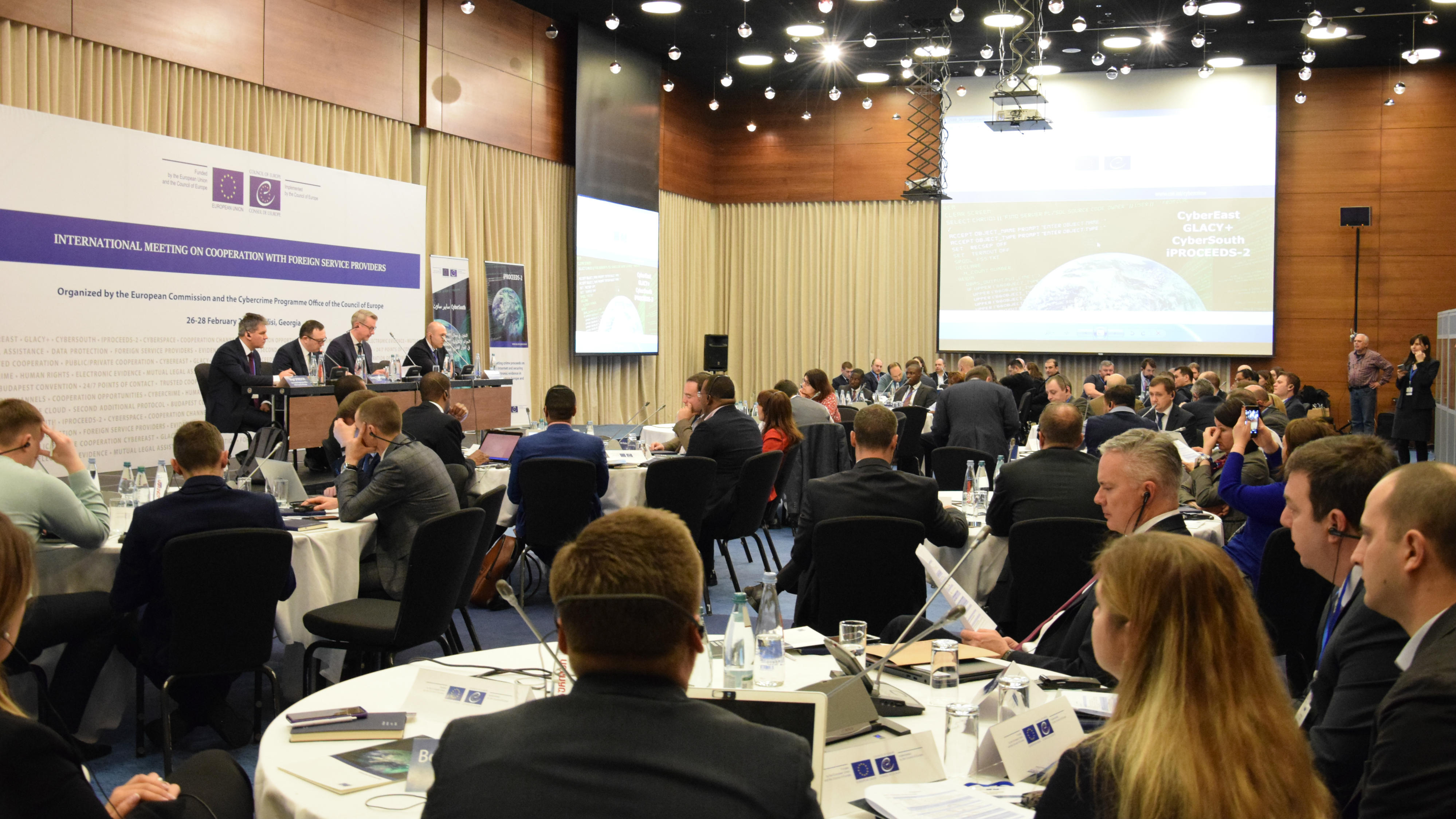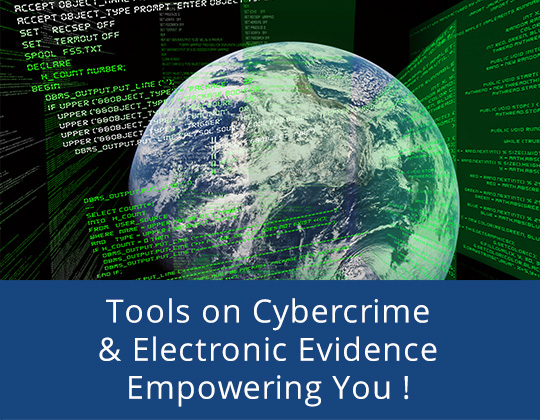The European Commission and the Cybercrime Programme Office of the Council of Europe (C-PROC) based in Bucharest, Romania hosted in Tbilisi, Georgia an international meeting on cooperation with foreign service providers. The event took place from Wednesday, 26 February 2020 to Friday, 28 February 2020 and was organised as a joint effort of several projects implemented by C-PROC, namely CyberEast, GLACY+, CyberSouth, iPROCEEDS-2.
Cooperation between criminal justice authorities and private sector entities, including in particular service providers, is essential to protect societies against crime. Such cooperation concerns primarily access by police and prosecution services to data held by service providers for criminal justice purposes, but also the sharing of information and experience, as well as training.
In this sense, the European Commission and the C-PROC hosted 80 participants from 30 countries around the world, including from the Latin America (Chile, Dominican Republic, Costa Rica, Paraguay), South-East Asia (Sri Lanka), Western African countries (Ghana, Nigeria, Cabo Verde, Burkina Faso), Southern Neighbourhood region (Lebanon, Morocco, Jordan), as well as the Eastern Partnership Region (Armenia, Azerbaijan, Belarus, Georgia, Moldova, Ukraine), the IPA region (Albania, Bosnia and Herzegovina, Montenegro, North Macedonia, Serbia, Turkey) and Belgium, the Netherlands, Germany, Austria, Romania. The event benefited also from the attendance of a large Georgian delegation of more than 25 representatives, as well as from the participation of the EU Delegation to Georgia, Eurojust, Council of Europe Office in Georgia, Council of Europe experts, US Department of Justice and representatives from Facebook and EuroISPA.
In his opening remarks on the first day of the event, H.E. Carl Hartzell, EU Ambassador to Georgia, mentioned:
''Tackling cybercrime is fundamental to effective criminal justice. Fighting corruption, organised crime, economic crimes, even crimes against persons, these days require an effective framework to fight cybercrime – for instance in relation to access to e-evidence or online crime proceeds. Cooperation between criminal justice authorities and with private sector entities, including in particular service providers, is essential in this respect. Of course, strong cybersecurity must go hand in hand with an open, free and secure cyberspace where human rights, fundamental freedoms and the rule of law fully apply.''
Mr. Virgil Spiridon, Head of Operations of the Cybercrime Programme Office of the Council of Europe (C-PROC) based in Bucharest, Romania, mentioned that:
“The cooperation between law enforcement and multinational service providers (MSPs) concerns not only cybercrime investigations, but also other types of investigations which are involving electronic evidence and data from MSPs” and that the Second Additional Protocol to the Budapest Convention “will bring new solutions for cooperation”.
Speaking from the private sector’s perspective, Mr. Maximilian Schubert, President of the European Internet Service Providers Association (EuroISPA), drew the attention on the fact that:
“Both law enforcement authorities and the Internet Service Providers (ISPs) want to make the Internet safe for users; however, ISPs have a different mindset, not focusing on investigating and prosecuting, but on keeping the customers satisfied. [They] have a common interest, but the approaches might differ — this is important to keep in mind when looking for cooperation.”
Presentations and discussions were also led by Mr. Markko Kunnapu, Ministry of Justice of Estonia, member of the Cybercrime Convention Committee (T-CY) Bureau of the Council of Europe, Mr. Robert Laid, Judicial Cooperation Advisor, Member of the Cybercrime Team, Eurojust, Mr. Jan Kerkhofs, Federal Magistrate, Federal Prosecutor’s Office of Belgium, Mr. Givi Bagdavadze, International Cooperation Department, Prosecutor General’s Office of Georgia, Mrs. Sopio Chareli, Deputy Head of Law Enforcement Oversight Department, State Inspector’s Service of Georgia, Mr. Birger Witt, Trust and Safety Lead EMEA, Facebook, Mr. Marjan Stoilkovski, Head of Cybercrime Department, Ministry of Interior, North Macedonia and Council of Europe Expert, Mrs. Patricia Adusei-Poku, Ghana, Council of Europe Expert, Mr. Scott Kerin, US Department of Justice, US Embassy, Bucharest, Romania, as well as Mr. Giorgi Jokhadze, Project Manager of the CyberEast project, and C-PROC team.
The sessions addressed the context for cooperation with foreign service providers, practical examples, Eurojust’s SIRIUS project which is a useful repository for law enforcement and judiciary in Europe, provider policies and cooperation channels and opportunities: European perspective, human rights aspects/data protection concerns related to cooperation with foreign service providers, strategies of cooperation with foreign service providers, new opportunities for cooperation, as well as open discussion on experience of cooperation from across all regions represented during the event.
The event was held in English, with simultaneous Georgian, French, Russian and Spanish interpretation available.
The Cybercrime Programme Office of the Council of Europe (C-PROC) in Bucharest, Romania is responsible for assisting countries worldwide in strengthening their legal systems capacity to respond to the challenges posed by cybercrime and electronic evidence on the basis of the standards of the Budapest Convention on Cybercrime.
C-PROC, with its capacity building function, complements the work of the Cybercrime Convention Committee (T-CY) through which State Parties follow the implementation of the Budapest Convention.
For further details about the four projects that jointly supported the organisation of this event (CyberEast, GLACY+, CyberSouth, iPROCEEDS-2) together with the European Commission, please consult each of the projects’ websites or the general C-PROC website (www.coe.int/cybercrime).
This activity was organized joining resources with Cybercrime@Octopus project.





